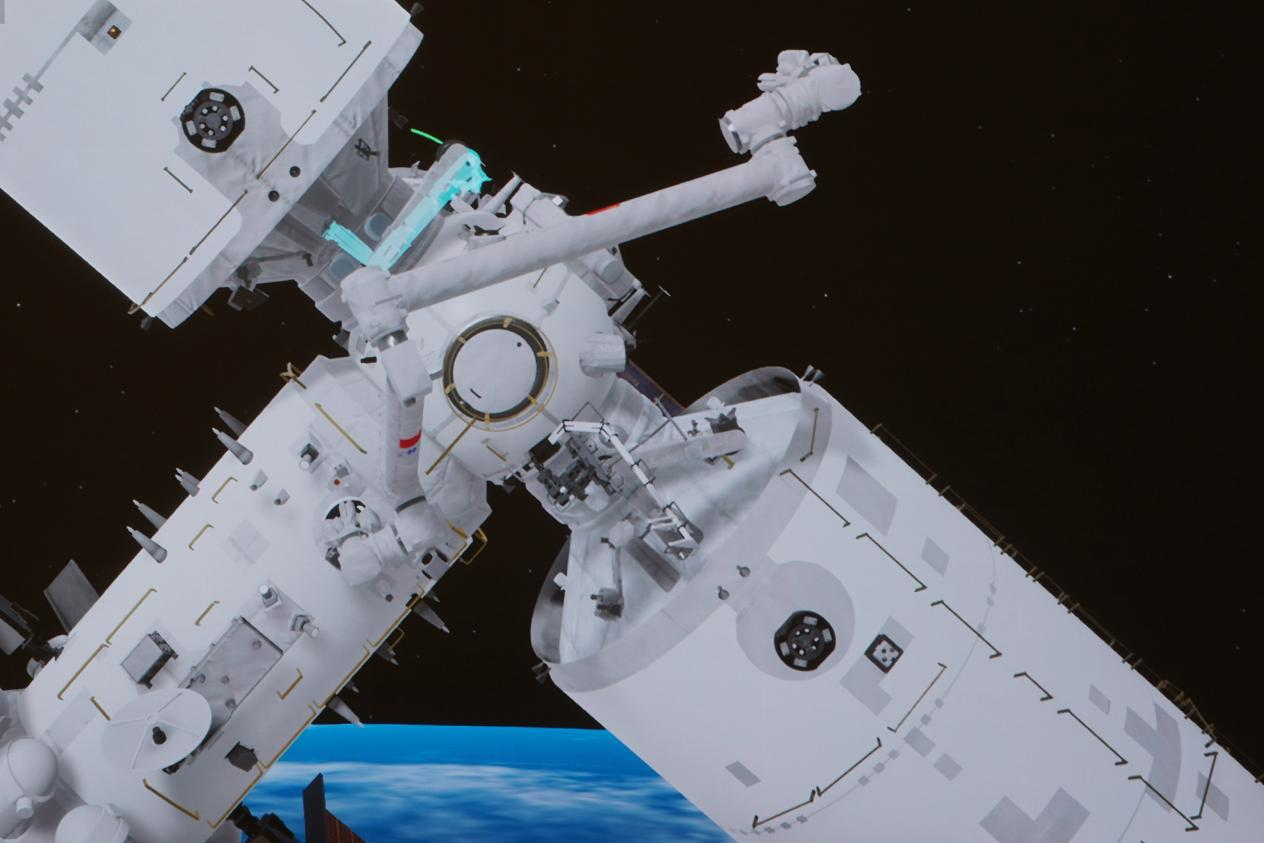
This simulated image captured at Beijing Aerospace Control Center on Nov. 3, 2022 shows China's space station lab module Mengtian after completing in-orbit transposition.(Xinhua)
Strengthening basic research is an urgent requirement for achieving greater self-reliance and strength in science and technology, and it is the only way to become a world leader in science and technology.
-- Xi Jinping
Quote backgrounder: Xi Jinping, general secretary of the Communist Party of China (CPC) Central Committee, made the remarks when chairing the third group study session of the Political Bureau of the 20th CPC Central Committee, calling for strengthening basic research to consolidate the country's self-reliance and strength in science and technology.
In the session, Xi stressed:
•Basic research is the initial end of the scientific research chain from research to application and then to production. Only when a solid foundation is laid, will the sci-tech building be built tall.
•To cope with international sci-tech competition, achieve greater self-reliance, foster a new development pattern, and promote high-quality development, there is an urgent need to strengthen basic research and address key technologies from the source and from the bottom.
Why achieving self-reliance in science and technology matters:
•Self-reliance in science and technology is the foundation of national prosperity and the key to national security.
•China will move faster toward self-reliance in science and technology so as to relieve the stranglehold some countries have tightened on China's development of core technologies.
•U.S. technological hegemony: The United States seeks to deter other countries' scientific, technological and economic development by wielding monopoly power, suppression measures and technology restrictions in high-tech fields.
-- The U.S. administration has stopped providing U.S. companies with licenses to export to Huawei and is pushing a deal with Japan and the Netherlands for them to impose new restrictions on exports of chip-making tools to China.
-- The U.S. government has tightened its controls on semiconductor chip exports to China, a hegemonic sci-tech step aimed at hobbling China's access to cutting-edge technologies.
-- The United States has fabricated a slew of excuses to clamp down on China's high-tech enterprises with global competitiveness, and has put more than 1,000 Chinese enterprises on sanction lists.
Review of China's sci-tech achievements:
Here are some of China's achievements in science and technology:
•Space exploration
China achieved 39, 55 and 64 space launches in 2020, 2021 and 2022 respectively, up significantly compared to the pre-pandemic period.
Tianzhou-4 cargo craft, Shenzhou-14 manned spaceship, Wentian lab module, Mengtian lab module, Tianzhou-5 cargo craft, Shenzhou-15 spaceship... Six flight missions have been carried out in 2022 in the construction phase of China's space station.
•BeiDou Navigation Satellite System
China's BeiDou Navigation Satellite System (BDS) has been built into a world-class navigation system. It can offer a wide range of services, such as positioning, navigation, timing, international search and rescue. It is the world's first navigation satellite system to provide a global short message communication service.
•FAST telescope
China's Five-hundred-meter Aperture Spherical Radio Telescope (FAST), the world's largest single-dish radio telescope, has identified over 740 pulsars since its launch.
•First C919 delivered
The first C919 large passenger aircraft was delivered to its first customer, China Eastern Airlines in December 2022 -- the first time ever for China's civil aviation transport market to have an indigenously-developed mainline jetliner.
•AG600M aircraft testing
China has put three AG600M aircraft into flight test missions. The aircraft is a full-configuration firefighting model of the AG600 large amphibious aircraft family.
•Quantum technology
In May 2022, China set a new record in long-distance quantum states transmission between two ground stations over 1,200 kilometers via a quantum scientific experiment satellite.
•Carbon dioxide monitoring satellite
China's carbon dioxide monitoring satellite TanSat has produced its first batch of human-caused carbon dioxide emission (CO2) signatures, offering a scientific basis for the country's efforts to combat global warming.
Extended reading:
Xi Focus: Xi stresses basic research for self-reliance in science and technology
Xi inspects Wuhan, stresses China's self-reliance in science and technology
China's sci-tech progress not to be hammered by technology blockade
China speeds up sci-tech innovation amid COVID-19 challenges in past three years
GLOBALink | Milestones in Science & Technology: Year in Review #China2022



